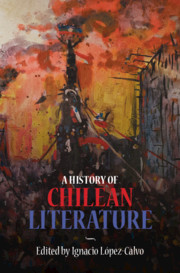Book contents
- A History of Chilean Literature
- A History of Chilean Literature
- Copyright page
- Dedication
- Contents
- Figures
- Contributors
- Acknowledgments
- Introduction
- Part I Proto-Chilean, Colonial Chronicles and Letters
- Part II Nineteenth-Century Articulations of an Embryonic National Consciousness
- Chapter 6 Rosario Orrego Castañeda (1831/4–1879) and the Proto-Feminist Writing Scene
- Chapter 7 The Feuilleton Tradition
- Chapter 8 The Historical Novel
- Chapter 9 From the Public to the Private
- Chapter 10 Literature and Literary Markets
- Chapter 11 Modernization and Culture
- Part III Beyond Chileanness: Heterogeneity and Transculturation in Canonical and Peripheral Twentieth- and Twenty-First-Century Literature
- Index
- References
Chapter 11 - Modernization and Culture
from Part II - Nineteenth-Century Articulations of an Embryonic National Consciousness
Published online by Cambridge University Press: 27 September 2021
- A History of Chilean Literature
- A History of Chilean Literature
- Copyright page
- Dedication
- Contents
- Figures
- Contributors
- Acknowledgments
- Introduction
- Part I Proto-Chilean, Colonial Chronicles and Letters
- Part II Nineteenth-Century Articulations of an Embryonic National Consciousness
- Chapter 6 Rosario Orrego Castañeda (1831/4–1879) and the Proto-Feminist Writing Scene
- Chapter 7 The Feuilleton Tradition
- Chapter 8 The Historical Novel
- Chapter 9 From the Public to the Private
- Chapter 10 Literature and Literary Markets
- Chapter 11 Modernization and Culture
- Part III Beyond Chileanness: Heterogeneity and Transculturation in Canonical and Peripheral Twentieth- and Twenty-First-Century Literature
- Index
- References
Summary
The long process of modernization, which in the Western world manifested itself as a maelstrom of contradictions due to huge demographic upheavals, unprecedented urban growth, a burgeoning state bureaucracy, and technological advances that resulted in uneven industrial development and socioeconomic prosperity, started in Chile soon after its independence in 1810 and lasted until 1973, the beginning of Pinochet’s military dictatorship. This process of rapid changes, confusion, and excitement, which accompanied Chile’s entry into the expanding and fluctuating capitalist world market, occurred in two phases.
- Type
- Chapter
- Information
- A History of Chilean Literature , pp. 216 - 236Publisher: Cambridge University PressPrint publication year: 2021



